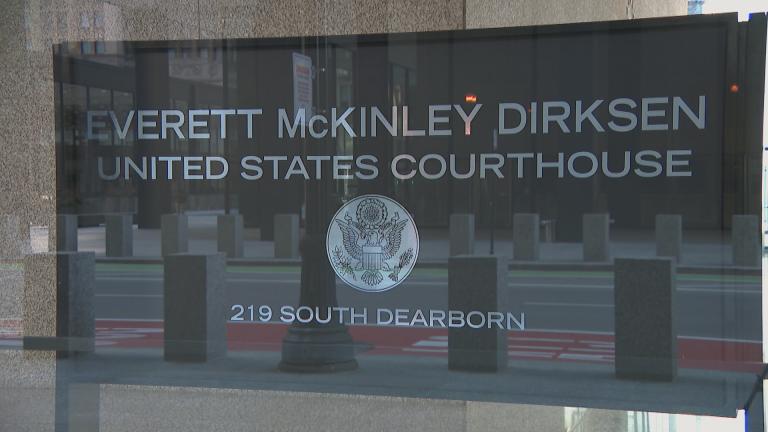A federal judge has permanently banned Illinois’ panhandling law from being enforced on the basis the statute violates the First Amendment. The case was part of a yearlong effort by advocates including the American Civil Liberties Union and Chicago Coalition for the Homeless (CCH) to eliminate such laws.
But at least one Chicago alderman said the city wants a new plan to help curtail the aggressive begging that began after Chicago revoked its panhandling ordinance in late 2018.
In the case that resulted in the federal order issued Jan. 11, CCH attorney Diane O’Connell said the plaintiffs — a pair of homeless men, Michael Dumiak and Christopher Simmons — had been ticketed multiple times by Downers Grove police for soliciting for money when suburban homeless shelters were out of space.
“They would move around night to night, and it was a lottery system, so if they didn’t draw your name, you didn’t get in. They fill up a lot in the winter. So these clients were really doing this for one very specific purpose, which was to pay for a room at the Red Roof Inn,” O’Connell said.
Downers Grove police had acted on a local ordinance, based on a state statute that reads: “No person shall stand on a highway for the purpose of soliciting employment or business from the occupant of any vehicle.”
O’Connell said the local and state laws are illegal because they discriminate based on the content of speech, as well as who can say it. While her clients got in trouble when asking for money, nonprofit groups can get permits to sit roadside and ask drivers for charitable contributions.
“Our clients … were ticketed many, many times simply for asking for help,” O’Connell said. “The issue is the First Amendment of the U.S. Constitution protects freedom of speech, and although it does not protect absolutely all types of speech, it does protect people from having their speech discriminated against.”
In a federal decision handed down last week, Judge Robert Gettleman agreed, issuing a permanent injunction based on the finding that Illinois’ law is “a content-based restriction on the freedom of speech that is not justified by any compelling interest and that the provision violates the First Amendment and is unconstitutional on its face under clearly established law.”
Gettleman cites the U.S. Supreme Court decision Reed v. Town of Gilbert (Arizona), as well as a Seventh District federal court decision, Norton v. City of Springfield, which ruled unconstitutional a panhandling ordinance in Illinois’ capital city.
As part of the order, both Downers Grove and Illinois State Police – while not explicitly stipulating to the finding that the laws are unconstitutional – agreed to being permanently enjoined from enforcing them.
“Counsel for the Illinois State Police acknowledged the constitutional issues of the language of this statute. As part of the temporary injunction, the agency agreed to stop writing citations under this statute. That prohibition continues under the permanent injunction that was reached on Jan. 11,” state police spokesperson Beth Hundsdorfer said in a statement.
According to O’Connell, at least three communities — Danville, Cicero and Joliet — kept “unconstitutional panhandling ordinances” on the books after advocates warned them about legal issues in 2019.
When asked by email whether the ISP was taking action to notify communities about the federal court order, Hundsdorfer responded that “each department is responsible for ensuring it complies with all state and federal laws.”
It’s a sentiment shared by Gettleman, who in a July decision in the case, determined that the Downers Grove police officers who had written panhandling tickets are not entitled to qualified immunity, “a doctrine that shields government officials against damage suits. Officials are immune from suit unless they violate a constitutional right that was clearly established at the time of the violation.”
While the village police had argued they were doing their jobs, Gettleman wrote that “content based laws usually violate the First Amendment. The former Village ordinance and Illinois statue are no exception. Both are content based restrictions on speech without any compelling justification” and that based on the Reed and Norton cases Downers Grove and Illinois’ laws were “flagrantly unconstitutional.”
“Reasonably prudent police officers would have so concluded,” Gettleman wrote. “The Village police officers violated clearly established First Amendment law and are not entitled to qualified immunity.”
As for the officers’ argument that they “should not be expected to divine evolving developments and conclude that constitutional principles relating to content-based discrimination would apply to a statute (designed in this case) to prevent pedestrians from endangering themselves,” Gettleman wrote that “qualified immunity doctrine assumes that ‘a reasonably competent public official should know the law governing his conduct.’”
Safety — of drivers and panhandlers – is often a concern for critics of rescinding such ordinances, but O’Connell said municipalities can, and do, take measures to address that, such as making it illegal to obstruct traffic.
The difference, she said, is that it’s not based on who is obstructing traffic and what they’re saying while doing so.
After the Norton and Reed cases the Illinois Municipal League advised members to instead adopt ordinances against crimes like battery.
Chicago was one of the communities that Ald. Brian Hopkins (2nd Ward) said recognized the writing on the wall and in late 2018, with little to no debate, quietly revoked its panhandling ordinance.
Hopkins, whose ward covers parts of downtown, said that it had been rarely used – Chicago police only ticketed panhandlers exhibiting aggressive behavior.
But once the ordinance was lifted, he said business owners experienced an uptick in people soliciting money from patrons outside and at sidewalk cafes.
“Restaurants felt like there was very little they could do without that tool to use, when someone would come into the dining area and go table to table and not leave the table until the diners gave them money,” Hopkins said. “That was very threatening to the diners and uncomfortable for the restaurant staff, who were often asked to intervene but they didn’t know what they could do.”
He said without the aggressive panhandling ordinance, restaurateurs also reported their al fresco diners saw more purses and phones getting snatched.
Hopkins also said that causes problems for the downtown hotel and tourism industry.
“If you’re from out of town, it may be much more upsetting to you to be seated at an outdoor café and to have someone come up to your table and aggressively panhandle you. Chicagoans, you know, maybe take that a little more in stride, especially people who live downtown – you know we’re used to that, it doesn’t rattle us, and you know, we’re generous people so we typically give a dollar or whatever,” he said.
Chicago has also previous panhandling near ATMs, banks and currency exchanges.
Hopkins said while panhandling itself isn’t a common problem in those places, robbery is, and until it’s too late there’s no way to tell whether someone loitering near an ATM or inside an ATM vestibule is “innocently panhandling or it may be a precursor to committing a robbery. We can’t tell in advance.”
He said that’s justification for passing a new ordinance restricting that sort of behavior.
Hopkins said he’d been working on a proposal, but then the coronavirus pandemic hit.
He plans to pursue the issue again in the future.
While not specifically addressing Hopkins’ plans or concerns, O’Connell said she is hopeful that the federal decision will effectively wipe out all panhandling restrictions in a single, broad stroke.
She said homeless people go through a lot already: “Stigmatization, stereotyping and discrimination.
“These panhandling laws are a really a tool that municipalities use to infringe on people’s rights, to hide them and exclude them from public spaces, to criminalize and fine people who are already poor and are not going to able to pay those fines. They are absolutely a draconian tool that just really has no place in our society,” she said.
Follow Amanda Vinicky on Twitter: @AmandaVinicky








